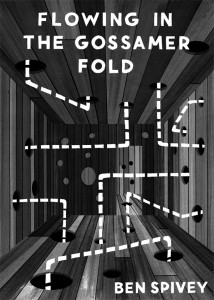Black God by Ben Spivey
 Black God
Black God
by Ben Spivey
Blue Square Press, November 2012
144 pages / $6.00 Buy from Blue Square Press or Amazon (ebook)
“There’s something black in that place like it was untouched by God himself…or herself…”
*
Black God envelopes and overwhelms: to read it is to surrender to death and despair’s stark seduction, evoked by Spivey’s terse lyricism and brutal plot.
Cooper O’Rourke, protagonist, narrates his erasure from reality. He’s resigned himself to the New American Dream (his words): “keep working, don’t die.” The same can’t be said for his wife, an ex-architect with a malignant brain tumor. She’s just as resigned but to dying, kept alive nightly by a bedside respirator.
In a way, the couple live together:
“We were nearing retirement age—it would be overly simple to say that things never get easier…The same two cars were parked in the driveway. The same two cats leaped and slept—they’d loop infinity symbols between our legs…We tunneled around our home in paths to places that only we knew—a home is where we keep our secrets.”
The anemia of daily life ends with the wife’s articulation of her dying wish: for Cooper to assume guardianship of a home that isn’t theirs. He carries out her request—but the house harbors something too dark inside, and Cooper is enticed out of reality and into another world, half fugue state, half fever dream.
*
Summarizing Black God does it a disservice. Reiteration of its plot leaves the book’s essence—its languorous stasis—uncaptured. This stasis lurks in the subtext of Cooper’s narrative, and proves difficult to quantify. Its source seems to be traumas continually suffered by the protagonist, both in waking and dreaming life.
At first Cooper’s traumas manifest in the everyday—most aspects of life get the better of him, particularly the accumulation of age and time’s elusiveness:
“How much older we were…Change was expected, of course, but at the same time unexpected, rather creeping it seeped through all of the distractions: work, commute, religion, bills, sleep, health—we don’t always notice how we change…Myself as a boy would not recognize myself as a man. Might not recognize myself from dinner to dinner. Winter to winter.”
Cooper makes multiple mentions of this preoccupation with time, and it begins to appear as more than a simply anxiety. I call it a trauma because of its concrete effect on narrator, as shown in his narrative. Language could easily be added to Cooper’s list of seeped-through distractions: Each mention of change, of time or age, informs the compressed nature of Cooper’s story, and begins to suggest itself as the actual cause:
“ A clock ticked. The noise droned long after the hand moved onto the next second. That noise sustained too and the ticking (thickening) continued one onto another, another—the sounds and seconds stacked over each other, enveloping, encapsulating…”
For Cooper, time does not simply pass. His heightened description of a clock merely ticking suggests time as a solid substance, capable of thickening, enveloping—perhaps suffocating.
Of course, Cooper never points to the effects of his traumas. He simply observes them along with the reader, “How it seemed one day [he] slept and woke again married and older.”
Cooper also struggles with a lack of marital intimacy. Although lack of love isn’t implied, Cooper and his wife are clearly estranged—their house is full of secrets, of paths that only they know about, respectively.
Cooper’s narration places his wife at a distance, as does his failure to call her by name. His perception of her suggests continual unfamiliarity. He constantly looks at his wife as if seeing her for the first time. Otherwise she resembles something inhuman, or unfamiliar—while lying next to her he compares her twitching muscles to “hummingbird wings or piano strings.”
As Black God progresses, Cooper’s traumas begin to manifest outside of language, become physical repercussions. On a walk home, Cooper goes deaf and begins bleeding from every orifice, after hearing the sound of a “disoriented…reverberating clock.” He returns home unable to articulate what’s happened to his wife, nor can he hear a word she says. “My wife held her mouth open for a long time,” he observes. “She was either screaming or hinging it agape.”
*
Cooper’s quotidian traumas are soon replaced by those of his dreams. Observing the house inexplicably draws images from his dreams into reality—sporadic anachronisms. After entering the house, Cooper is submerged entirely, transported to a beach from which he’ll never return.
If a dream harbors the dreamer’s secret yearnings, Cooper’s reveals a deep-seated masochism. His is not the expected conventional idyll: instead of an alternative to his harsh reality, Cooper’s dreamscape hosts its own variety of trauma, specifically acute corporeal harm. Although Cooper’s dream afflictions are more severe than real life’s, their repercussions aren’t negative. Dream-trauma either resolves the problems of waking life, or leads to a transcendent, nirvana-like experience.
The dream hosts several reunions between Cooper and his wife. They find an intimacy, impossible in their own lives, through mutual corporeal harm, inflicted upon them by the forces of nature or by each other. Their limited conversation no longer reflects an inability to communicate, but the futility of verbal communication:
“When the stones were stacked…she pushed my left hand…between the friction of the stones. I felt the stinging salt air filling the new cuts. I felt the sun’s warmth…[she] thrust my shoulder, and shoved my waist into the stone’s cracks…You’re almost there, she said…Lastly she pulled my tongue from my mouth, she kept it balled in a fist. With all of my body reaching…like pieces of ribbon, twisted in the new breeze…She too filtered through the stones, falling over, and into the ocean…”
Although Cooper’s body is put through excruciating violence (and at his wife’s hands), the event is just as transcendent and intimate as it is traumatic. His wife comforts him while harming his body; he feels the sun’s warmth—a pleasant sensation. The event is both better and worse than anything from their reality. The couple suffers more than they did in reality, but it leads them to an higher state unattainable in life.
*
Although trauma is only one of Black God’s multiple threads, Spivey primarily deals in the aesthetics of suffering. He takes a common artistic preoccupation to the extreme, casts light on the darkest parts of the psyche without compromising their shadows.
You might consider Spivey a sentimental pioneer, a revealer of a despair better left untouched—or he may expose something you strive to forget, a dark matter that could have only been extracted from your nightmares.
***
Kara Clark (@karaaclark) is a writer from Connecticut.
***
(Blue Square Press is currently working on relaunching their site, so please note that the URL may change at time. For updates, find them on Facebook.)
December 9th, 2013 / 12:00 pm
I Knew That There Was Nothing Beyond It: An Interview with Ben Spivey
 Earlier this summer, Blue Square Press released their first title, Ben Spivey’s Flowing in the Gossamer Fold. Told in a series of mostly short, alternatingly Lutz-real and dreamlike passages, the book contains an interior logic and realm of imagery somewhere on the cusp of no realm, fresh and familiar at the same time. Over the past week or so, I asked Ben about the book’s creation, his influence, and more about the future of this new press over email.
Earlier this summer, Blue Square Press released their first title, Ben Spivey’s Flowing in the Gossamer Fold. Told in a series of mostly short, alternatingly Lutz-real and dreamlike passages, the book contains an interior logic and realm of imagery somewhere on the cusp of no realm, fresh and familiar at the same time. Over the past week or so, I asked Ben about the book’s creation, his influence, and more about the future of this new press over email.
Let’s start at the beginning: How did Gossamer begin in you as an idea?
It began as a drowning feeling. When I was first thinking about Gossamer I knew I wanted to tell a story about a man losing everything he was comfortable with. I knew how I wanted it to end, in fact I had the last sentence written in the first draft, the line was never changed.
So your writing the novel was all movement toward that last sentence? How did the moves reveal themselves? Over what time?
I started writing the novel in February of 2009 and I finished it sometime around March of this year. The moves revealed themselves as pieces to a puzzle. I kept a Moleskine journal with me at all times, jotting down ideas. For that year I never stopped thinking about Malcolm. A lot of the time I put into the novel was spent arranging the scenes and the moments, moving and cutting chapters, paragraphs, sentences. The beginning was originally the middle. I was working toward that last sentence; I knew that there was nothing beyond it.
November 17th, 2010 / 2:08 pm
Blue Square Press
 Introducing Blue Square Press, who will release their first title, Ben Spivey’s Flowing In The Gossamer Fold, in August.
Introducing Blue Square Press, who will release their first title, Ben Spivey’s Flowing In The Gossamer Fold, in August.
Here’s what Gary Lutz said about it: “Ben Spivey’s alluringly melodial debut novel of a marriage gone asunder unreels itself with the indisputable logic of dreams and delivers, along its phantasmagoric and dazing way, emotional clarities that feel entirely new.”
INTERVIEW WITH WARM MILK PRESS EDITORS
this is an interview with the editors of WARM MILK PRESS, ben spivey, jennifer whitley, and kyle whitley. their first title is MUSUEM OF FUCKED, by david peak, and can be pre-ordered now. interview after break.
